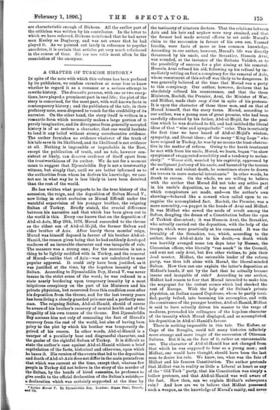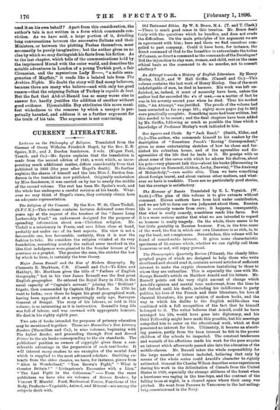A CHAPTER OF TURKISH HISTORY.*
IN spite of the note with which this volume has been prefaced by its publishers, we confess ourselves at some loss to know whether to regard it as a romance or a serious attempt to rewrite history. The dramatis personx, with one or two excep- tions, have played a prominent part in real life ; the plot of the story is concerned, for the most part, with well-known facts in contemporary history ; and the publishers of the tale, in their prefatory note, seem disposed to vouch for the credibility of its narrator. On the other hand, the story itself is written in a romantic form which necessarily makes a large portion of it purely imaginative, and its divergence from generally accepted history is of so serious a character, that one would hesitate to lend it any belief without strong corroborative evidence. The author furnishes no evidence whatever of the truth of his tale save in its likelihood, and its likelihood is not evidence at all. Nothing is impossible or improbable in the East, except the publication of truth, and no tale, however con- sistent or likely, can deserve credence of itself apart from the trustworthiness of its author. We do not for a moment mean to suggest that Djemaleddin Bey is not a trustworthy witness, but simply that, until we are better informed as to the authorities from whom he derives his knowledge, we can- not see in what way be is less likely to Lave been deceived than the rest of the world.
He has written what purports to be the true history of the accession, the reign, and the deposition of Sultan Murad V., now living in strict seclusion as Murad Effendi under the watchful supervision of his younger brother, the reigning Sultan of Turkey. Briefly stated, the crucial difference between his narrative and that which has been given out to the world is this. Every one knows that on the deposition of Abd-ul-Aziz, May 29th, 1876, Murad succeeded to the throne as the eldest son of Abd-ul-Mejid, the former Sultan and elder brother of Aziz. After barely three months' reign, Murad was himself deposed in favour of his brother Abelorl- Hami d, the reason given being that he had suddenly developed madness of an incurable character and was incapable of rule. The measure was a strong one ; for the succession is not a thing to be lightly meddled with in Turkey, and the removal of Mtn-ad—unlike that of Aziz—was not calculated to meet popular apprevaL It could only have been justified, as it was justified at the time, by the hopeless insanity of the Sultan. According to Djemaleddin Bey, Murad V. was never insane in the strict sense of the word; he was reduced to a state nearly bordering upon temporary insanity by a most iniquitous conspiracy on the part of his Ministers and his private physician, but recovered from this condition Boon after his deposition from the throne, and for the last twenty years has been living a closely guarded prisoner and a perfectly sane man. The reigning Sultan, Abd-ul-Hamid, should of course be aware of his brother's recovery of mental health and of the illegality of his own tenure of the throne. But Djemaleddin Bey accuses him not only of concealing the fact of Murad's recovery from the rest of the world, but also of having been privy to the plot by which his brother was temporarily de- prived of his reason. In other words, Abd-ul-Hamid is a
usurper of a peculiarly base and disgraceful character, and the gaoler of the rightful Sultan of Turkey. It is difficult to state the author's case against Abd-nl-Hamid without a brief
capitulation of the facts, historical and otherwise, upon which he bases it. His version of the events that led to the deposition
and death of Abd-ul-Aziz does not differ in the main points from that which was current at the time, except that, whereas few people in Turkey did not believe in the story of the murder of
the Sultan, by the hands of hired assassins, he professes to give credit to the official declaration of the Sultan's suicide,— a declaration which was certainly supported at the time by
• Sultan Murad V. By Djatnaleddin Bey. Lundon; Sagan Paul, Treuela, and Co.
the testimony of nineteen doctors. That the relations between Aziz and his heir and nephew were very strained, and that the former had made several efforts to set aside Murad's claim to the succession in favour of his own son, Youssef Izzedin, were facts of more or less common knowledge. According to our author, however, Murad's life was directly threatened by his uncle, and the Seraskier, Hussein Avni, was sounded, at the instance of the Sultana Valideh, as to the possibility of success for a plot aiming at his removal. Hussein Avni refused his aid, following up his refusal by im- mediately setting on foot a conspiracy for the removal of Aziz, whose resentment of this rebuff was likely to be dangerous. It was generally believed at the time that Murad was a party to this conspiracy. Our author, however, declares that he absolutely refused his countenance, and that the three Ministers, Ruchdi, the Premier, Avni, the Minister of War, and Midhat, made their coup d'etat in spite of his protests. It is upon the character of these three men, and on that of Murad himself, that the story turns. Murad, according to our author, was a young man of great promise, who had been carefully educated by his father, Abd-ul-Mejid, for the posi- tion which he was destined to fill, and had imbibed the liberal ideas of that "wise and sympathetic" ruler. This is certainly the first time we have heard of Abd-ul-Mejid's wisdom, sympathy, and liberal ideas ; of the many "King Loge" who have reigned in Turkey, he was by no means the least obstruc- tive in the matter of reform. Owing to the harsh treatment he met with from his uncle, Murad, we learn, began "to show symptoms of exaggerated sensibility and a tendency to melan- choly." "Worse still, wearied by hie captivity, oppressed by the malignant jealousy of his uncle, and haunted by the terrors of a sudden and violent death, he sometimes strove to drown his terrors in more material intoxicants." In other words, he drank to excess. On the whole, we are willing to believe with the author that Murad did not take any active part in his uncle's deposition, as he was not of the stuff of which conspirators are made, and—on the author's own showing—behaved like a coward when called upon to re- cognise the accomplished fact. Ruchdi, the Premier, was a mere nonentity,—a puppet in the hands of Avni and Midhat. It was Midhat who sowed the seeds of revolt among the Softas, dangling the dream of a Constitution before the eyes of Turkish discontent; it was Hussein Avni, the Seraskier, who actually carried out the deposition, with the help of the troops, which were practically at his command. It was the brutality of the Seraskier, too, which, according to the author, drove Abd-ul-Aziz to his death,—a death which was horribly avenged some ten days later by Hassan, the Circassian officer, who literally "ran amok" in the Council, and sent not only Avni, but five other victims, to join their dead master. Midhat, the ostensible leader of the reform party, was thus left alone with Murad, the liberal-minded Sultan. How then can one explain the latter's deposition at Midhat's hands, if not by the fact that he actually became insane and incapable of rule ? According to our author, Midhat had reason to fear that Murad intended to make him the scapegoat for the violent scenes which had shocked the rest of Europe. With the help of the Sultan's private physician, an Italian named Capoleone, whom he partly terri- fied, partly bribed, into becoming his accomplice, and with the connivance of the younger brother, Abd-ul-Hamid, Midhat is said to have actually driven his master to the verge of madness, persuaded his colleagues of the hopeless character of the insanity which Murad displayed, and so accomplished his deposition in Abd-ul-Hamid's favour.
Thereat nothing impossible in this tale. The Kafess, or Cage of the Seraglio, could tell many histories infinitely more strange and more tragic of the succession of Ottoman Sultans. But it is, on the face of it, rather an unreasonable one. The character of Abd-nl-Hamid has not changed from that which be was supposed to bear as a young man ; and Midhat, one would have thought, should have been the last man to desire his rule. We know, too, what was the fate of Midhat and his famous Constitution. The author pretends that Midhat was in reality as little a Liberal at heart as any of the Old Turk" party, that his Constitution was simply a hollow pretence, and that Abd-nl-Hamid was well aware of the fact. How then, can we explain Midhat's subsequent ruin ? And how are we to believe that Midhat possessed such a weapon, as the knowledge of Murad's sanity, and never used it on his own behalf ? Apart from this consideration, the author's tale is not written in a form which commands con- viction. As we have said, a large portion of it, detailing long conversations between the successive Sultans and their Ministers, or between the plotting Pashas themselves, must necessarily be purely imaginative; but the author gives us nc clue by which we may distinguish his facts from his fiction. As to the last chapter, which tells of the communications held by the imprisoned Murad with the outer world, and describes the notable adventures in London of a young Turkish poet, a fair Circassian, and the mysterious Lady B—, "a noble sexa- genarian of Mayfair," it reads like a belated tale from The Arabian Nights. No doubt the story will find many believers, because there are many who believe—and with only too good reason—that the reigning Sultan of Turkey is capable de tout. But the fact that Abd.ul-Hamid has BO many worse sins to answer for, hardly justifies the addition of another without good evidence. Djemaleddin Bey attributes this more mani- fest wickedness to the remorse by which a usurper is per- petually haunted, and adduces it as a farther argument for the truth of his tale. The argument is not convincing.







































 Previous page
Previous page